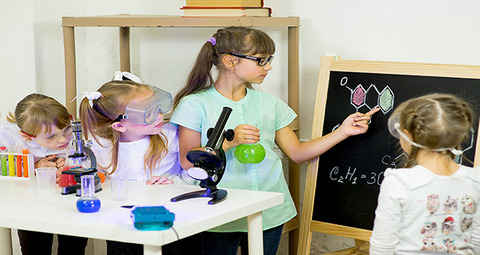Stereotypes - the good, the bad and the ugly
19 Dec 2016 by Evoluted New Media

Russ Swan has done the maths on scientific-stereotypes so we don’t have to…which, it turns out, is a good thing – scientists don’t really like maths…
Russ Swan has done the maths on scientific-stereotypes so we don’t have to…which, it turns out, is a good thing – scientists don’t really like maths…
Have you ever thought about what it is that separates scientists from the great unwashed mass of humanity? Obviously it isn’t just our good looks and charming personalities and, to be honest, it isn’t necessarily our intellect either (whisper it: there are some non-scientists who are actually quite clever too. I know, right?). But wherever you sit on the scientific spectrum, there are probably certain characteristics that we can recognise in one another. One of these, I would have thought, was a basic facility with mathematics. We’re not all organic supercomputers, but I would assume that most of us would be more comfortable with sums than is the average human.
In fact this might not be the case, if a couple of scientists from the University of Exeter have crunched their own numbers correctly. Dr Tim Fawcett and Dr Andrew Higginson found that their fellow physicists pay proportionately less attention to scientific theories crammed with mathematical details than to those presented in written style¹. They counted the citations garnered by 2000 papers in a leading physics journal, finding a direct correlation between the style of presentation and the number of times the work was referenced by other physicists.Equation density ranged from 0 to 8.75 equations per page, and the effect was undeniable: 8% fewer citations per equation per page. You can, as the expression goes, do the maths. It’s worth noting, by the way, that Fawcett and Higginson’s own paper on the topic is mercifully equation-free. Now, what if I told you that these two were not physicists but biologists? Would their discovery be more startling, or less? Hands up if you said less. (…Before I get accused of libel, I should make it clear; they really are physicists).
We’re not all organic supercomputers, but I would assume that most of us would be more comfortable with sums than is the average human.
As much as we may dislike stereotypical classifications, I think most of us would associate heavy mathematics, equations, and formulae more with physics than with biology. Going back to the idea of a spectrum, we could put biologists at one and, chemists in the middle, and physicists at the other end. Actual mathematicians, if we wanted to include them on this linear graphic, would have to reside in the second dimension. I’m afraid I’m going to leave our brethren the engineers out of this one, or else we’d have to get all non-Euclidean.
In the position occupied on the electromagnetic spectrum by infrared, we have the warm sciences of biology. In the colourful bit in the middle we have the chemists, and way down there in the ultra violet we find the physicists. Yes, OK, physics is cool. An alternative explanation is that if it moves, it’s biology; if it smells, it’s chemistry; and if it doesn’t work, it’s physics.Can we map anything else onto this continuum? Conventional pigeon-holing predicts that biologists may be a little less gregarious than other scientists, while physicists are the rock’n’roll party animals. The theory goes that biologists spend a lot of time doing intricate work by themselves, perhaps fixed to the microscope eyepiece, while physicists are involved in huge zillion-pound megascience projects with vast numbers of collaborators. It’s as if biologists are playing solitaire, chemists are playing poker, and physicists are immersed in the latest MMORPG (...apparently this stands for ‘massively multiplayer online role-playing games’, Ed. And yes, I was a biologist hence not knowing the term MMORPG – too busy with all that solitaire).
An alternative explanation is that if it moves, it’s biology; if it smells, it’s chemistry; and if it doesn’t work, it’s physics.
What we don’t know (and this might make a fun PhD topic) is whether this is cause or effect, nature or nurture. Do introverts gravitate towards biology, or does biology make introverts? Would a shoe-shuffling loner be drawn out of his shell by the endless round of extravagant and decadent parties that is the undisputed reality of a career in advanced physics?
I was prompted into this rainbow of thought by a recent Radio 4 programme in which Simon Baron-Cohen, professor of psychopathology at Cambridge, revealed that there is some truth in the stereotype that scientists and engineers display more autistic traits than the general population. Having an engineer for a father or grandfather gives a greater chance of being diagnosed on this spectrum, and children in primary schools around the Dutch Silicon Valley town of Eindhoven – which has a high concentration of scientists and engineers – had more than twice the prevalence of autism diagnoses as their peers in other cities.
Stereotypes. Don’t you just hate it when the evidence supports the assumption?In the real world, we all sit somewhere on each of a huge number of different and completely unrelated spectra. Musical, literary, scientific, athletic, social, you name it. They’re all there and it’s all good. How ghastly would it be if we were all the same? But what do we call this pan-universal spectrum of spectra?
I’m going with polychromatic metaspectrum, and I’m proud to occupy my nth-dimensional non-recurring point within it.

Russ Swan
References: 1. New Journal of Physics (vol. 18, article 118003) by Andrew D Higginson and Tim W Fawcett.
